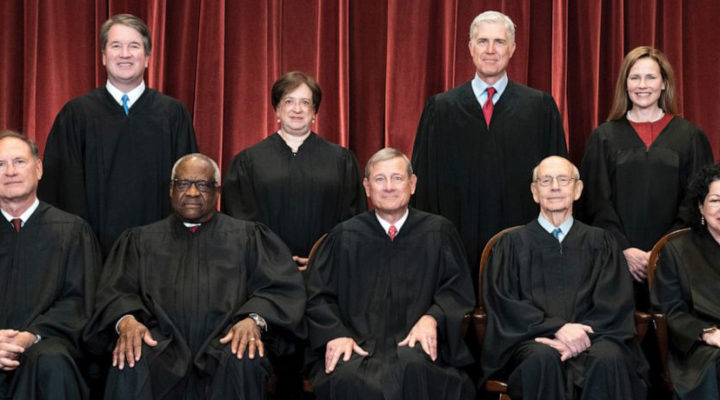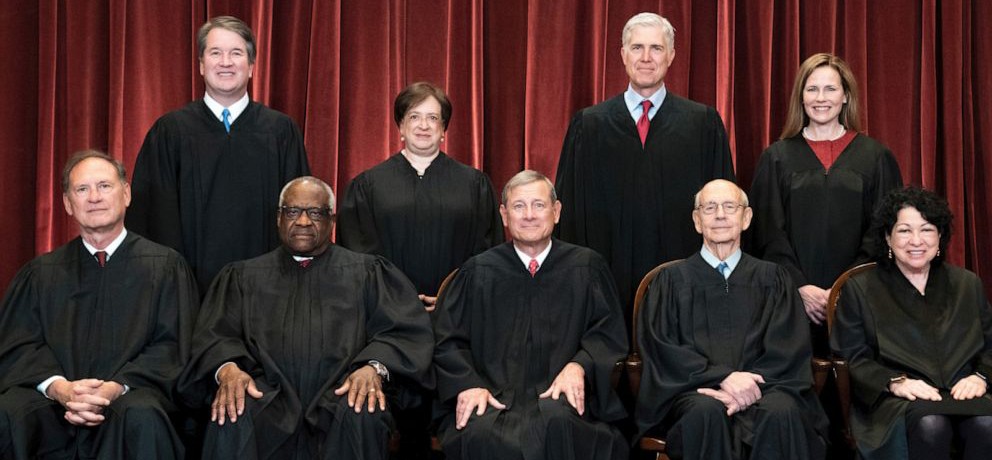All eyes are on the United States Supreme Court, now that a date (Dec. 1) has been announced for oral arguments in what could be the most consequential abortion case in 50 years.
But don’t expect to know the fate of Roe v. Wade just yet; the court often takes months to deliberate its landmark cases.
In fact, the high court’s decision on the forthcoming Mississippi abortion case that some believe could overturn Roe — called Dobbs v. Jackson Women’s Health Organization — might not be handed down until August 2022, nearly a year from now.
In the meantime, attention remains fixed also on Texas, where the first legal challenge has been mounted against the state’s extremely restrictive anti-abortion law that takes the novel approach of deputizing ordinary citizens — from anywhere in the nation — to file claims against anyone aiding and abetting the procurement of an abortion after about six weeks of fetal development.
Challenges to Texas law
A man from Arkansas and another from Illinois filed what appear to be the first legal actions under the new Texas law, according to The New York Times. The intent is not so much to challenge the doctor, Alan Braid of San Antonio, but to challenge the new Texas law. Braid also said he intentionally defied the law by performing an abortion in Texas, thus providing grounds for someone to file suit against him.
The Arkansas plaintiff, Oscar Stilley, said he’s “not pro-life” but hopes to vindicate the larger concept of American law, which presumably would include the 1973 Roe v. Wade decision that legalized abortion nationwide. The new Texas law purports to supersede the federal position allowing abortion.
“We pride ourselves on being a nation of laws. What’s the law?”
“We pride ourselves on being a nation of laws. What’s the law?” Stilley asked of the Texas legislation.
The U.S. Supreme Court declined to block the Texas law from taking effect Sept. 1 but has not ruled on its constitutionality. By most all legal perspectives, the Texas law defies the high court’s standard set forth in Roe and other abortion cases. When a challenge to the Texas law reaches the Supreme Court — which seems inevitable — will the court have ruled on the Mississippi case yet? That could be a key factor in the chains of events to unfold.
If the court uses the Dobbs case to in some way weaken or nullifying legalized abortion nationwide, that would give the court and the state of Texas greater leeway to keep the new Texas “fetal heartbeat” bill that is the cause of current concern.
Meanwhile, at least seven other states reportedly are hoping to mimic the Texas law, and similar legislation already has been introduced in the Florida Legislature.
But wait, there’s more from Texas
No sooner had the Biden administration filed a legal challenge to the highly restrictive Texas law — claiming it defies federal law and must be struck down immediately — than Texas Gov. Greg Abbott signed yet another restrictive abortion bill into law.
On Friday, Sept. 17, Abbott signed Senate Bill 4, which narrows the timeframe in which physicians are allowed to prescribe abortion-inducing medications to patients. Currently, such medication is allowed by both federal and state law up until the 10th week of pregnancy, but now in Texas the medications are banned after seven weeks — again in defiance of federal allowances.
The newest law also prohibits mailing abortion-inducing drugs.
The newest law also prohibits mailing abortion-inducing drugs — yet again setting a different standard than federal policy through a state law that would have to be monitored in some way by federal employees, the U.S. Postal Service workers who deliver the mail.
These early-term abortion-inducing medications are reportedly the most common method to terminate a pregnancy today, according to the Guttmacher Institute.
The Texas Tribune quoted Texas State Rep. Stephanie Klick, R-Fort Worth, calling the passage of Senate Bill 4 the “icing on the cake” of a legislative session that passed three anti-abortion bills. The third bill, similar to what several other states also adopted, would outlaw abortion completely in Texas if the Supreme Court overturns Roe v. Wade.
A possible patchwork of state laws
The reason for Texas passing an “if, then” law — that third anti-abortion bill — is to be prepared for a possible post-Roe scenario since the Texas Legislature meets only every other year, except for special sessions called by the governor for specific issues. Texas is one of 11 states to have adopted so-called “trigger” laws that would be automatically activated if the Supreme Court overturns legalized abortion by reversing itself on Roe v. Wade.
Such trigger bills are presumptuous on two fronts — first by assuming the high court will eventually overturn Roe, and second by assuming a revocation of Roe would be a complete reversal.
While Roe is best-known for guaranteeing that a woman has a constitutional right to terminate a pregnancy in the first six months of the pregnancy — a period before when it is considered “viable” for the fetus to survive outside the womb — it comes with several other definitions and rules also created by the court. Among those are an undue-burden standard, the definition of “viability,” and the definitions of exceptions due to the health or life of the mother.
But what if the Supreme Court does something less than abolish Roe?
Abortion opponents have argued that all these standards and definitions are too vague and not enforceable. Their hope is for the entire bundle of Roe v. Wade rulings and standards to be vacated on a federal level — throwing the question back to the states. The states’-rights option is a necessity because a complete ban on abortions nationwide cannot pass the U.S. Congress.
But what if the Supreme Court does something less than abolish Roe? What if the court instead redefines when a fetus is “viable” and therefore can’t be aborted? What if the court comes up with a different undue-burden standard?
To be sure, at least a few Supreme Court justices appear to favor the full states’-rights approach. Among them is Justice Clarence Thomas, who in a ruling last term asserted that the high court’s “abortion jurisprudence remains in a state of utter entropy.” He seemed to indicate that a return to a state-by-state policy would be easier.
A recent article in The Atlantic challenged that thought, however, by pointing out how a patchwork quilt of state-by-state abortion laws would create confusion and would be hard to enforce.
“If the court does overturn Roe, much of the American legal landscape — and with it, the lived experiences of millions — could change overnight, and the result will be a giant, legal mess,” wrote the three law school professors who jointly authored the piece.
They continued: “Perhaps the only certainty to expect is that a post-Roe country will be one of inequity. A little fewer than half of U.S. states, mostly concentrated in the South and the Midwest, are poised to ban abortion in almost all cases if the Supreme Court overrules Roe. … Scholars and activists have long noted that wealthy women in those states will be able to travel to other states to obtain abortions. But three-quarters of people seeking abortions are low-income, a group that is disproportionately people of color, and they will face barriers that will make it almost impossible to get to another state.”
It could be that each of the 50 states will get to create its own laws about abortion that will end at the state line.
In short, it could be that each of the 50 states will get to create its own laws about abortion that will end at the state line, where a different set of laws kicks in. What about women who cross state lines to find the services they need or want? Can one state make it illegal for its residents to visit another state for medical procedures or prescription medication?
Remember that early term abortions created spontaneously by prescription medication are the most common form of abortion in America today.
“Can a state prosecute women taking pills shipped directly to their home from out-of-state providers? Can a state prosecute a woman for taking pills in her home state if she picked up the medication in a state where abortion is legal?” the Atlantic writers ponder. “If a patient takes the pills in one state where abortion is legal but the abortion isn’t completed until she goes back home, where abortion is illegal (the entire process is usually quick but can take several days), has she violated her home state’s law?”
Back to Mississippi
Oral arguments will begin Dec. 1 on the Mississippi case, Dobbs v. Jackson Women’s Health Organization. The root question here is whether all state laws that ban “pre-viability” abortions are unconstitutional.
Mississippi currently bans most abortions after 15 weeks, which is seven to nine weeks before what the Supreme Court has held to be a time of fetal viability (typically 22 to 24 weeks). The 5th U.S. Circuit Court of Appeals, a conservative-leaning group, blocked enforcement of the Mississippi law, finding it in conflict with Roe v. Wade and subsequent abortion decisions. The state now has appealed that ruling to the Supreme Court.
Previous state-level bans on pre-viability abortions have been struck down in Alabama, Arkansas, Georgia, Kentucky, Louisiana, Montana, Missouri, Ohio, Oklahoma, South Carolina, Utah and Tennessee. But court observers believe this time could be different because of the conservative majority placed on the court by Donald Trump’s nominations and former Senate Majority Leader Mitch McConnell’s tactics.
Yet amid that recent history now falls the curious case of Texas, which has enacted a law more strict than those previously struck in other states but that so far has not been stopped by the Supreme Court.
Related articles:
When being ‘pro-life’ really isn’t: How I became a Democrat who opposes abortion |
Analysis by Chris Conley
SBC calls for ‘immediate abolition of abortion without exception or compromise’
Southern Baptists join Catholic bishops in asserting ‘no Constitutional basis’ for abortion at all


